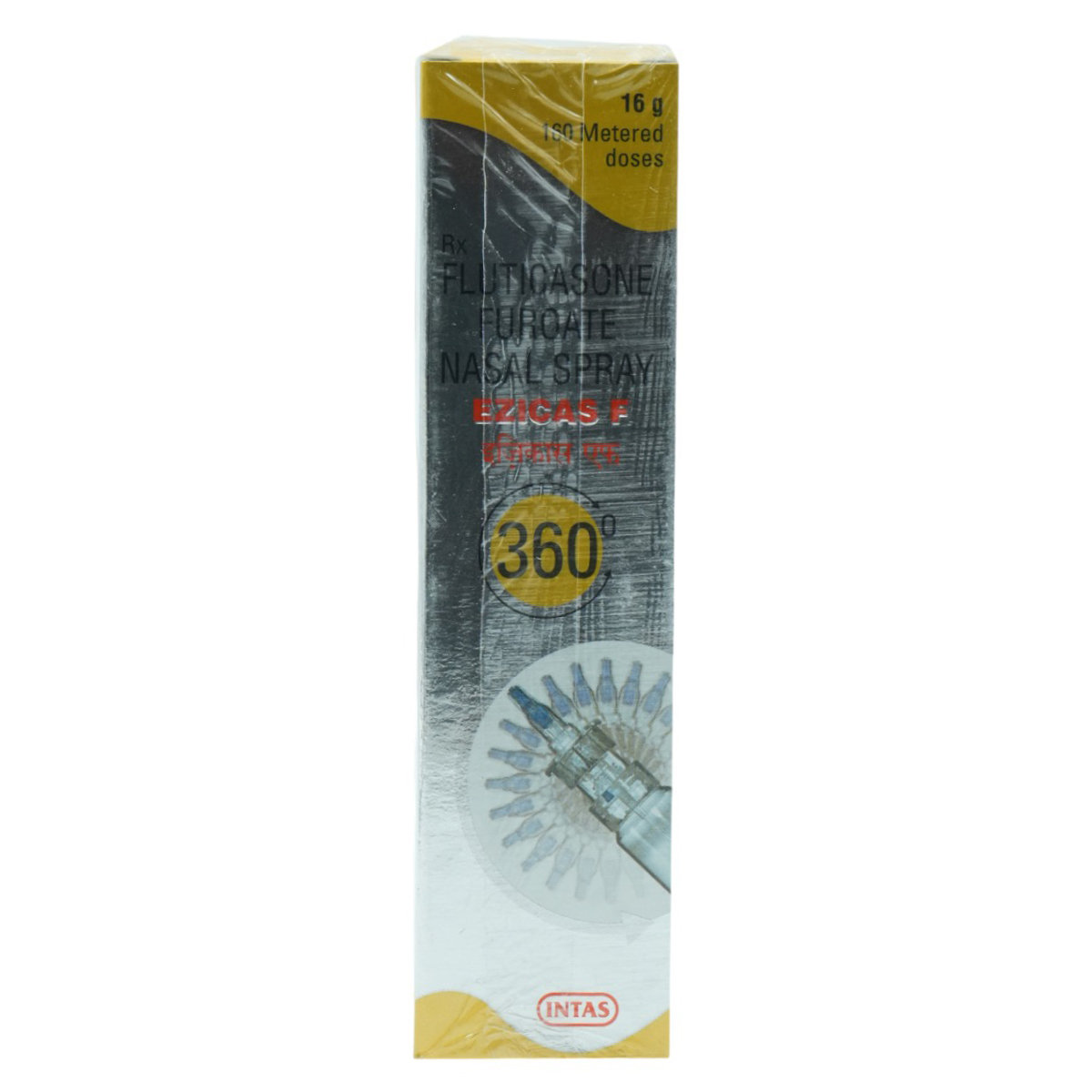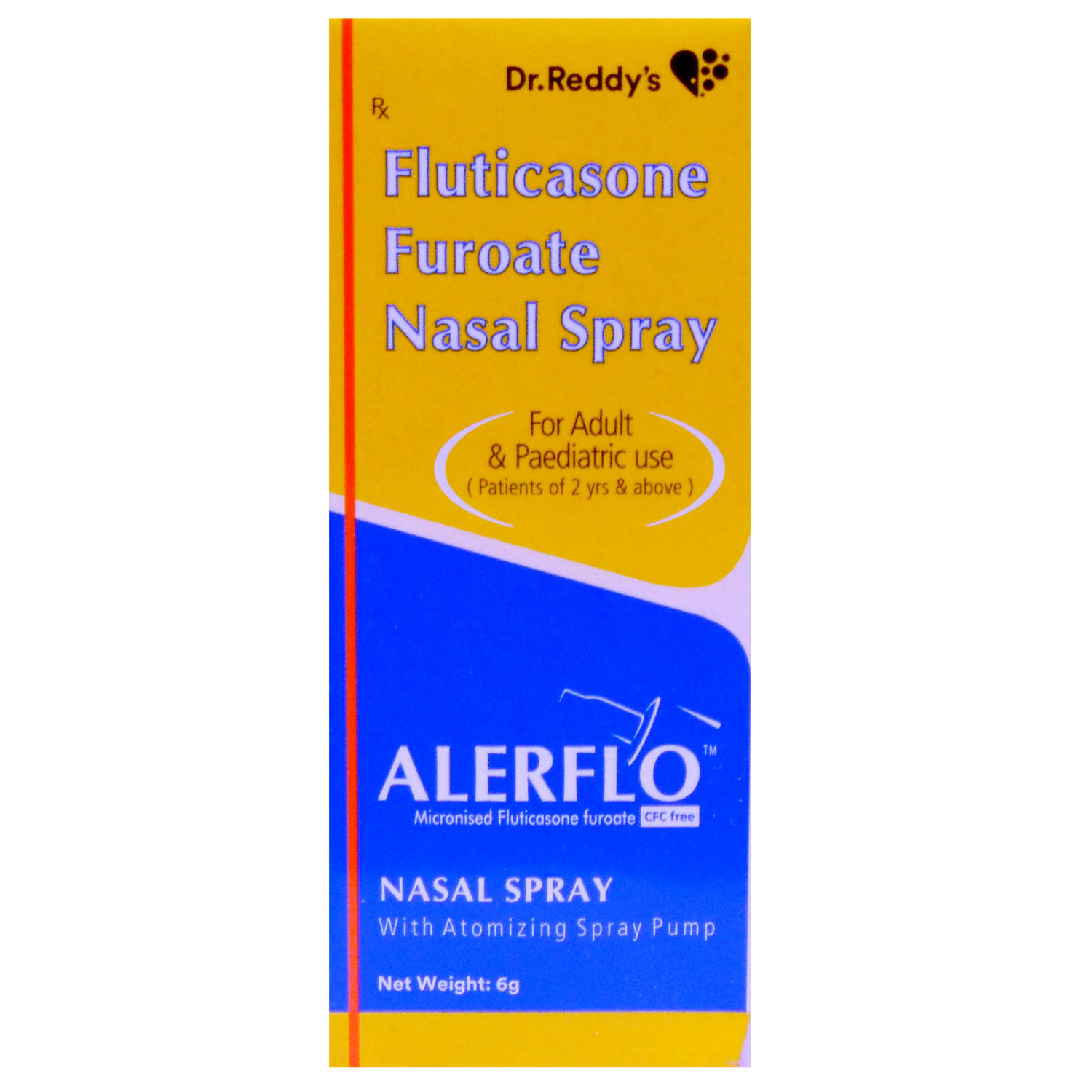Fluticasone
About Fluticasone
Fluticasone belongs to the class of corticosteroid medication. It is indicated for managing the nasal symptoms of seasonal, perennial allergic and non-allergic rhinitis in adult and paediatric patients aged four years and older. Seasonal allergies are caused by exposure to airborne substances (such as pollens) that are only present at specific seasons of the year. Perennial allergies are caused by year-round indoor exposure to airborne pollutants (such as house dust). Perennial non-allergic rhinitis, also known as vasomotor rhinitis, is a chronic illness characterised by symptoms similar to allergic rhinitis (runny nose, stuffy nose, sneezing, and nasal itching) but lasting for more than nine months each year.
Fluticasone contains fluticasone. Fluticasone works by inhibiting the release of certain chemicals in the body that cause inflammatory reactions. Thereby, it provides relief from a blocked or runny nose, sneezing, itching, watery eyes and an itchy nose.
Fluticasone is available on prescription only. Fluticasone must be taken as directed by the healthcare professional or as per leaflet information to get the maximum benefit of Fluticasone. With Fluticasone, very little medicine is absorbed into the rest of the body, so it's not likely to give you side effects. In rare cases, you may experience headaches, nausea, vomiting, sore throat, nose bleeds, trouble breathing, cough, burning, or itching. Most of these side effects of Fluticasone do not require medical attention and gradually resolve over time. However, if the side effects persist or worsen, please consult your doctor.
Tell your doctor if you have had an allergic or hypersensitive reaction to fluticasone or other medicines. If you are a pregnant woman or nursing mother, do not consume Fluticasone without first consulting your doctor. Avoid Fluticasone use in patients with recent nasal ulcers, surgery, or trauma. It is recommended not to use in children under four years of age. Children aged four years and older can use Fluticasone under the supervision of a healthcare professional. The development of eye conditions such as cataracts and glaucoma has been reported with the use of fluticasone nasal sprays. You should have a yearly eye exam to check for these conditions. Before using Fluticasone, please tell your doctor if you have or have ever been treated for fungal, bacterial, viral or parasitic infections. Also, tell your doctor if you have tuberculosis (a type of lung infection).
Uses of Fluticasone
Medicinal Benefits
Fluticasone contains fluticasone. Fluticasone works by inhibiting the release of certain chemicals in the body that cause inflammatory reactions. As a result, it relieves symptoms such as a blocked or runny nose, sneezing, itching, watery eyes, and an itchy nose.
Directions for Use
Storage
Side Effects of Fluticasone
- Headache
- Nausea
- Vomiting
- Sore Throat
- Nose Bleeds
- Trouble Breathing
- Cough
- Nose Burning or Itching
Drug Warnings
Tell your doctor if you have had an allergic or hypersensitive reaction to fluticasone or other medicines. If you are a pregnant woman or nursing mother, do not consume Fluticasone without first consulting your doctor, as it will only be prescribed if the benefits overweight the risks. Patients with recent nasal ulcers, surgery, or trauma should avoid using this product. The development of eye conditions such as cataracts and glaucoma has been reported with the use of fluticasone nasal sprays. You should have a yearly eye exam to check for these conditions. Before using Fluticasone, please tell your doctor if you have or have ever been treated for fungal, bacterial, viral or parasitic infections. Also, tell your doctor if you have tuberculosis (a type of lung infection). The safety and effectiveness in children under the age of four have not been satisfactorily proven. Children aged four years and older can use Fluticasone under the supervision of a healthcare professional.
Drug Interactions
Drug-Drug interactions: Fluticasone may interact with antifungal medicines (e.g. ketoconazole) and HIV medications (e.g. ritonavir, cobicistat, nelfinavir).
Drug-Food Interactions: No interactions found.
Drug-Disease Interactions: Fluticasone may interact with disease conditions, including hyperadrenocorticism (excess of adrenocortical hormones), infections (viral, bacterial or fungal), ocular herpes simplex, ocular toxicities (glaucoma and glaucoma), osteoporosis, chickenpox, and measles or tuberculosis (TB, a type of lung infection).
Drug-Drug Interactions Checker List:
Safety Advice

Alcohol
safe if prescribedNo interaction was found. However, it is advisable not to take or limit alcohol as a precautionary measure.

Pregnancy
cautionPlease consult the doctor. Fluticasone should be used in pregnant women only if clinically needed, and the benefits outweigh the risks.

Breast Feeding
cautionPlease consult the doctor. Fluticasone should be used in breastfeeding mothers only if the benefits outweigh the risks.

Driving
safe if prescribedFluticasone usually does not affect your ability to drive or operate machinery.

Liver
cautionTell your doctor before receiving the Fluticasone if you have had a liver impairment/disorder history. Your doctor will prescribe only if the benefits outweigh the risks.

Kidney
cautionTell your doctor before receiving the Fluticasone if you have had a kidney impairment/disorder history. Your doctor will prescribe only if the benefits outweigh the risks.

Children
cautionThe safety and effectiveness in children under the age of four have not been satisfactorily proven. Children aged four years and older can use Fluticasone under the supervision of a healthcare professional.
Habit Forming
Diet & Lifestyle Advise
- Keep your hygiene in check and your surroundings neat.
- Include ginger in your daily intake. Some anti-inflammatory chemicals in ginger help relax airway membranes.
- Keeping hydrated. Coughing, runny nose, and sneezing can be relieved by drinking beverages at room temperature.
- Stress weakens the immune system and increases the likelihood of being ill. An individual can exercise regularly, meditate, practise deep breathing, and try progressive muscle relaxation techniques to relieve stress.
- Wish for 7-9 hours of sleep per night to keep fit and safe.
- It is best to avoid coming into touch with recognised allergens (allergy-causing agents) such as pollen, dust, etc.
- Avoid certain food that is known to trigger allergies in you.
- Processed foods and those high in sugar and fat should be avoided because they may trigger inflammation.
- Reduce your daily salt intake and replace it with herbs or spices such as garlic, ginger, and turmeric, which contain natural anti-inflammatory ingredients.
- Please avoid contact with dust as it might worsen your symptoms.
- Stop smoking; quitting smoking can significantly reduce the severity and frequency of your symptoms.
- Also, please avoid contact with pollen in the air as it might worsen your symptoms.
- Contact with any person with chickenpox, measles, or tuberculosis should be avoided as it might cause you the same infection as Fluticasone makes your body prone to infections.
Special Advise
- Do not stop taking Fluticasone suddenly without talking to your doctor first, which may worsen your symptoms.
Patients Concern
Disease/Condition Glossary
Seasonal allergies: Seasonal allergies are caused by exposure to airborne substances (such as pollens) that emerge exclusively at specific seasons of the year. Seasonal allergies cause itchy skin, a runny nose, sneezing, and often itchy or watery, bloodshot eyes.
Perennial allergies: Perennial allergies are caused by year-round indoor exposure to airborne pollutants (such as house dust). Perennial allergies induce a clogged, itchy, and sometimes runny nose and irritated lips and throat.
Perennial nonallergic rhinitis: Perennial nonallergic rhinitis, also known as vasomotor rhinitis, is a chronic illness characterised by symptoms similar to allergic rhinitis (runny nose, stuffy nose, sneezing, and nasal itching) but lasting for more than nine months each year.
FAQs
Fluticasone is present in Fluticasone. Fluticasone is a corticosteroid that prevents the release of specific molecules in the body that trigger inflammatory responses. As a result, it relieves symptoms such as a blocked or runny nose, sneezing, itching, watery eyes, and an itchy nose.
Avoid use in patients with recent nasal ulcers, surgery, or trauma. Please check with the doctor if you have concerns regarding this.
It may take several days of regular use for your rhinitis symptoms to get better. Call your healthcare provider if your symptoms do not improve or get worse.
Do not stop using the Fluticasone unless your healthcare provider tells you to do so. Suddenly stopping treatment with Fluticasone can make you feel unwell and may give you symptoms.
It is not advised to be used in persons with glaucoma or cataracts. The use of nasal corticosteroid medications may aggravate glaucoma and/or cataracts.
Fluticasone may cause headaches in a few cases. Rest and drinking plenty of fluids are recommended. Don't consume too much alcohol. Consult your doctor if the headache persists or becomes severe.
If you miss a dose of Fluticasone, take the missed dose as soon as you remember it. However, if it's almost time for the next dose, do not take a double dose to make up for a missed one.






